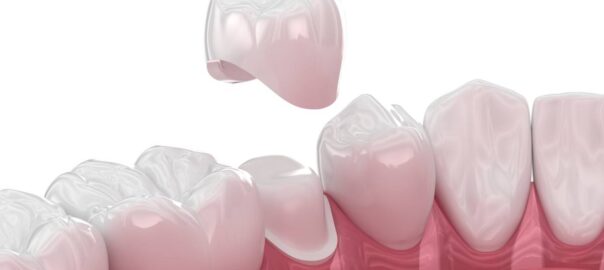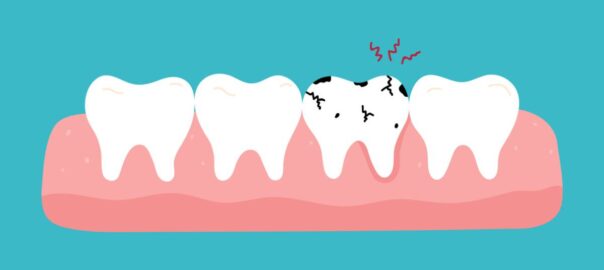Dental crowns are a dental restoration solution often used to save a severely decayed or damaged tooth from extraction. A crown is a cap that covers the top of the tooth to protect it from damage and restore its function and appearance. But how long do dental crowns last? In this article, we discuss the factors that can influence the lifespan of your crowns and give tips on how to prolong it.
How Long Do Dental Crowns Last?
Dental crowns can be made of several different materials, which will partially determine their longevity. Other factors that can influence how long your dental crowns will last include:
- The efficiency of your oral hygiene
- Your dietary habits
- Your lifestyle habits
- Presence of underlying oral health issues
- Frequency of professional dental cleanings and checkups
Let us start by looking at the longevity and pros and cons of different materials used for making dental crowns.
Resin Composite Dental Crowns
Resin composite is a versatile material commonly used in dentistry, for example, for dental fillings, veneers, and dental crowns. The advantages of this material are that it is tooth-colored, so it looks natural in the mouth, and it can be less expensive than some other options.
However, resin composite is one of the less durable materials for dental crowns, with an average longevity of between 5 and 10 years.
Porcelain Dental Crowns
Porcelain is one of the most commonly used materials in dentistry. It offers a very natural look due to its slight translucency and remarkable durability. Porcelain dental crowns are typically more expensive than resin composite ones, but they can last for up to 15 years with good care.
Metal Dental Crowns
Metal, such as silver amalgam or gold, is one of the strongest materials for dental crowns, with a potential longevity of up to 20 years or longer in some cases. However, nowadays, these materials are less popular because they are highly noticeable in the mouth. Gold or silver amalgam dental crowns are mainly used to treat teeth at the back of the mouth, which are not visible when you speak or smile.
Porcelain-fused-to-metal Dental Crowns
Porcelain-fused-to-metal dental crowns offer both the durability of a metal base and the natural appearance of porcelain. This option can last for 15 years or longer. However, porcelain that coats metal can wear off quickly.
Zirconia Dental Crowns
Zirconia is another natural-looking material that can potentially be more durable than porcelain. They last for up to 15 years. However, zirconia crowns are often more expensive than other options.
Tips on Dental Crown Care to Prolong Its Lifespan
Regardless of the material your dental crown is made of, proper daily care is crucial for maintaining its shape over time. Here are some tips that can help you prolong the lifespan of your dental crown:
- Remember that efficient and thorough oral hygiene should be your priority. Bacteria that live in plaque and tartar that accumulate in your mouth if it is not cleaned regularly are the biggest enemies of your oral health and your dental restorations. Dentists recommend brushing your teeth for two full minutes twice a day with fluoride toothpaste and flossing every evening. Also, try adding a water flosser as a first step of your routine (but keep in mind that it is not a replacement for traditional brushing and flossing.)
- Visit your dentist twice a year for professional cleanings and checkups. This way, you will be able to identify any potential issues with your crowns and address them before they become serious problems.
- Be mindful of what you eat: avoid sticky, hard, and crunchy foods, as they can chip, crack, dislodge, or scratch your crowns. Additionally, staining foods, such as red wine, coffee, tea, berries, beetroot, and curry, can cause discoloration of your crowns. We recommend avoiding these foods or brushing your teeth immediately after consuming them.
- Protect your dental crowns from physical damage. Wear a mouthguard if you play contact or extreme sports, and avoid using your teeth as tools. Additionally, if you have bruxism, consider wearing a mouth guard at night and consult with your dentist to address the issue.
Get a Long-Lasting Dental Crown at Samaritan Dental
Do not hesitate to make an appointment with an experienced dentist at the Samaritan Dental office today. At our clinic, we utilize high-quality dental crown materials that provide durability and reliability. Our specialists are looking forward to your visit.

















 Yelp
Yelp I have never had a better dental experience prior to my visit with Dr. Zabolian. It was pain free for the first time ever, the staff was friendly, accommodating to my schedule, there were no problems with my insurance claims... I am so happy I have found a dentist (after all these years) I feel so comfortable going to and also taking my family.
I have never had a better dental experience prior to my visit with Dr. Zabolian. It was pain free for the first time ever, the staff was friendly, accommodating to my schedule, there were no problems with my insurance claims... I am so happy I have found a dentist (after all these years) I feel so comfortable going to and also taking my family. 






